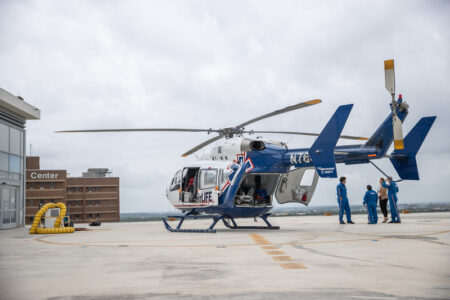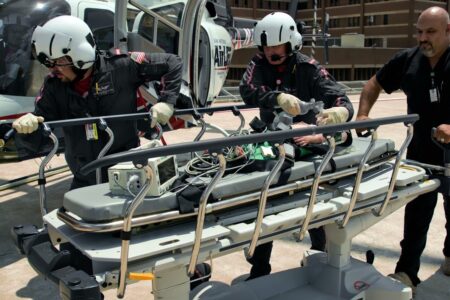Facilities

UT Health San Antonio
The UT Health San Antonio (formerly known as The University of Texas Health Science Center at San Antonio) is the leading research institution in South Texas and one of the major health sciences universities in the world. With an operating budget of $838 million, UT Health San Antonio is the chief catalyst for the $42.4 billion biosciences and health care industry, the leading sector in San Antonio’s economy.
UT Health San Antonio is one of 15 components of The University of Texas (UT) System, and comprises five schools (Medical, Dental, Nursing, Health Professions, and the Graduate School of Biomedical Sciences) with eight campuses in four cities. It is the primary training site for health professionals serving the South Texas region. The FY18 research awards and sponsored program activity at the institution totaled $185.3 million. UT Health San Antonio has had an estimated $35 billion impact on the region since inception and has expanded to six campuses in San Antonio, Laredo, Harlingen and Edinburg.
More than 26,000 graduates (physicians, dentists, nurses, scientists and allied health professionals) serve in their fields, including many in Texas. UT Health San Antonio faculty are international leaders in cancer, cardiovascular disease, diabetes, aging, stroke prevention, kidney disease, orthopedics, research imaging, transplant surgery, psychiatry and clinical neurosciences, pain management, genetics, nursing, allied health, dentistry and many other fields.
The vision of community leaders, combined with the energy, talent and dedication of UT Health San Antonio students, faculty and staff, make UT Health San Antonio a major force in the biosciences today and for the 21st century.
Department of Emergency Medicine at UT Health San Antonio
 The Department of Emergency Medicine is dedicated in its commitment to providing excellent clinical care. Emergency Medicine is the front line of health care in San Antonio. With a strong emphasis on education and research, this department is the home of the next leading generation of Emergency Medicine physicians and researchers.
The Department of Emergency Medicine is dedicated in its commitment to providing excellent clinical care. Emergency Medicine is the front line of health care in San Antonio. With a strong emphasis on education and research, this department is the home of the next leading generation of Emergency Medicine physicians and researchers.
With key collaborators that span throughout the UT System as well as the Department of Defense, the Department of Emergency Medicine boasts a diverse research portfolio that includes clinical trials, medical device development, in addition to medical education and health services research.
The department has fellowships in EMS, disaster medicine, global health, education, clinical ultrasound, and wilderness medicine.
The department is led by Dr. Ralph Riviello, and is home to not only leading researchers, but also faculty that include specialties in toxicology, prehospital care, pediatric emergency medicine, global health, ultrasound, and hyperbaric medicine. Nearly 90 faculty, advanced practice providers, fellows and residents comprise the physician and provider cadre. 25 staff support the mission including a dedicated research coordinator, grants specialist, and research assistants providing clinical trials support.
The research section is lead by Dr. Robert A. De Lorenzo, MD, MSM, MSCI, FACEP (vice chair) and Dr. William Fernandez, MD is the assistant research director.
The Military Health Institute at UT Health San Antonio
 Established in 2014, the Military Health Institute (MHI) has a goal of expanding the existing collaborations between UT Health San Antonio and the Department of Defense (DoD) and the Department of Veterans Affairs (VA). The Institute is endowed by the USAA Patty and Joe Robles, Jr. Endowment in Military Health.
Established in 2014, the Military Health Institute (MHI) has a goal of expanding the existing collaborations between UT Health San Antonio and the Department of Defense (DoD) and the Department of Veterans Affairs (VA). The Institute is endowed by the USAA Patty and Joe Robles, Jr. Endowment in Military Health.
MHI assists faculty with their research from ideation to commercialization with a goal of enhancing Department of Defense (DOD) and Department of Veterans Affairs (VA) research activity at the University. The MHI helps bring military lessons learned to the civilian setting.
Clinical advances gained from military operations often have a reciprocal impact on our civilian populations. Some examples are the incorporation of “Stop the Bleed” training into civilian settings, advocating for the appropriate use of tourniquets to control bleeding, bringing lessons on preventing accidents and teamwork from the military aviation world into the civilian clinical setting, utilizing military algorithms when responding to a trauma, and promoting our region’s use of whole blood for prehospital resuscitation.
Research
Research Support Staff
Stephanie Perez, MHA
Project Manager, Research
Phone: 210-450-8973 |
Email: perezs11@uthscsa.edu
